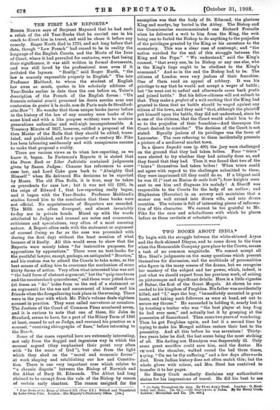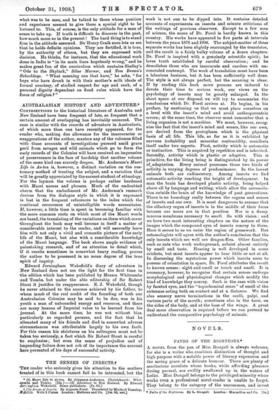TWO BOOKS ABOUT INDIA.* To begin with the struggle between
the white-skinned Aryaa and the dark-skinned Dasyas, and to come down to the time when the Honourable Company gave place to the Crown, means a task of no common magnitude. We cannot accept all Mrs. Steel's judgments on the many questions which present themselves for discussion, and the multitude of personalities who figure in the many scenes of the drama, but we recognise her mastery of the subject and her power, which, indeed, is just what we should expect from her previous work, of seizing on picturesque and significant details. Here is a little vignette of Babar, the first of the Great Moguls. At eleven be suc- ceeded to his kingdom of Ferghbna. His father was accidentally killed, and "I," says the boy, "immediately mounted in great haste, and taking such followers as were at hand, set out to secure my throne." He succeeded in holding it, nearly lost it by trusting a traitor who was "the best player at leap frog he had ever seen," and actually lost it by grasping at the possession of Samarkand. Then came two years of wandering. Then he got Ferglilina again, and lost it a second time by trying to make his Mongol soldiers restore their loot to the peasantry. And all this before he was seventeen ! Thirty- two years later he died, the last scene being the most striking of all. His darling son Humayun was desperately ill. Only some great sacrifice could save him, said the doctor. He en'ered the chamber, walked round the bed three times, a tying, "On me be thy suffering," and a few days afterwards died. Even Indian history does not often match this; but the whole glows with colour, and Mrs. Steel has contrived to transfer it to her pages.
Sir Henry Craik modestly disclaims any authoritative status for his impressions of travel. He did his best to see
• (1) India Throughout the Ages. By Fl 3ra Asnle Steel. London : /31. Rout. ledge and Sons. [4s. 6d.]—(2) Impretsions of India. By Sir Henry Craik. London : Macmillan and Co. [3s. net.) what was to be seen, and he talked to those whose position and experience seemed to give them a special right to be listened to. This, of course, is the only attitude for a man of rsense to take up. If truth is difficult to discover in the past, bow much more so in the present ! The hard thing is to stand firm in the attitude assumed. Sir Henry Craik soon lets us see that he holds definite opinions. They are fortified, it is true, by the authority of others, but they are expressed with -decision. He thinks, for instance, that the educational work -done in India is "in its main lines hopelessly wrong," and he -makes great fun of the curriculum which contains Shelley's -" Ode to the Skylark," Silas Horner, and Tons Brown's Selwoklays. "What meaning can that have," he asks, "for boys who have drunk in with their mother's milk ideals of formal courtesy, of studied respect for age and rank, of a personal dignity dependent on fixed rules which have the lorce of religion P "















































 Previous page
Previous page